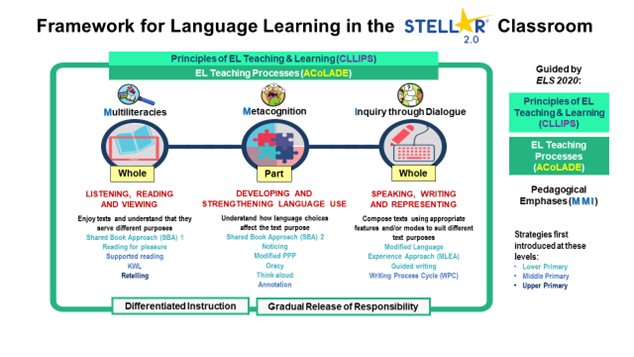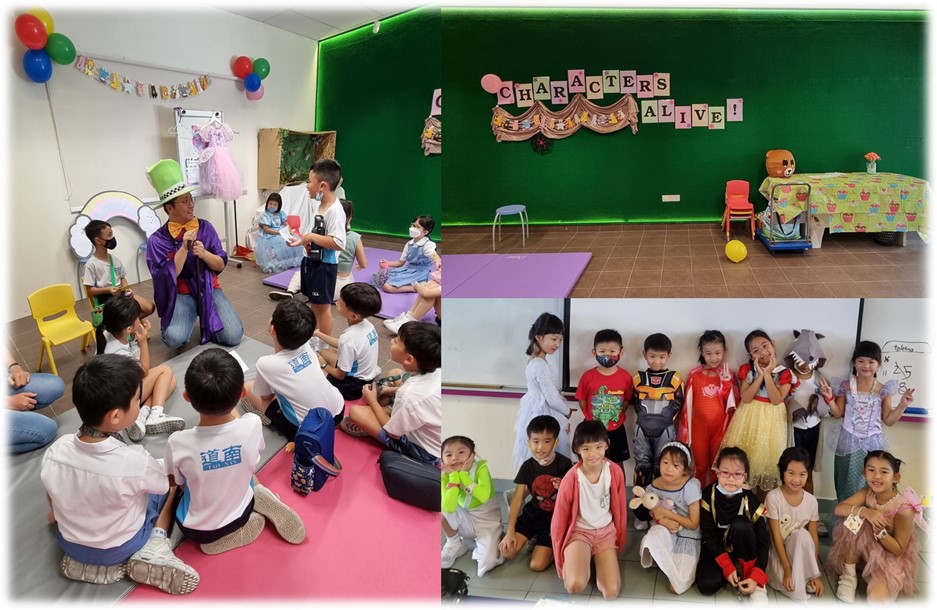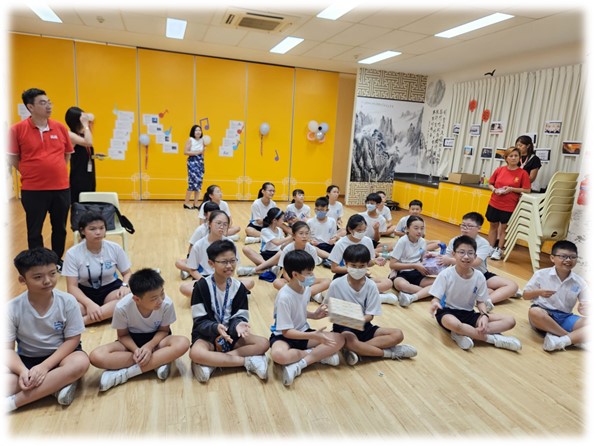英文 English
Vision / Mission
Vision
A stimulating and enriching language learning environment for students to become competent users of the English Language
Mission
To develop confident, eloquent and empathetic communicators of the English
Language
Key Programmes / Activities
STELLAR 2.0 Curriculum
STELLAR stands for Strategies for English Language Learning And Reading.
It is currently being implemented from Primary 1 to 6. Rolled out since
2020, STELLAR 2.0 is an interactive literacy programme that fosters confidence
in learning English using children's literature. The curriculum focusses
on strengthening students’ foundation in grammar, oracy, writing and reading.
It also reinforces the teaching of receptive and productive skills, namely:
Reading and Viewing, Listening and Viewing, Writing and Representing, Speaking
and Representing, Grammar and Vocabulary.
The learning framework for STELLAR 2.0 takes into account the principles of EL teaching and learning, CLLIPS, as spelt out in the English Language Syllabus 2020. This ensures that the language is taught in meaningful contexts, through integrating the different areas of language learning and introducing language skills and strategies in an explicit and systematic way.
The whole-part-whole approach ensures that learning is contextualised and meaningful.

The Shared Book Approach is used to teach reading and viewing skills from Primary 1 to 3 (up to Semester 1). Thereafter, the strategies adopted are explicit instruction of Reading Comprehension, Annotation, Supported Reading and KWL.
One period is set aside for extensive reading. This aims to inculcate the love for reading, and cultivate an appreciation of a wide array of texts on Singaporean, Asian and contemporary themes
For Writing & Representing, Primary 1 and 2 teachers use the Modified Language Experience Approach (MLEA) and Guided Writing strategy while the Writing Process Cycle is introduced at P3 from semester 2 onwards.
Oracy & Vocabulary are taught explicitly in context.
The noticing strategy and the Modified Presentation, Practice and Production (PPP) approach are strategies for the teaching of Grammar.
Learning Support Programme (LSP) for English
LSP provides additional support for students in Primary 1 and 2 who lack basic English literacy skills. Students attend lessons for half an hour a day in small groups and are taught by specially trained teachers using strategies that will improve their reading ability.
Reading Remediation Programme (RRP)
Fully
implemented since 2017, RRP supports Primary 3 and 4 students with literacy
difficulties who are not diagnosed with dyslexia. RRP aims to help these
students read with fluency and understanding. Students who were previously
not on LSP and assessed to be able to benefit from additional support at
the end of Primary 2 can also be supported in RRP.
School-based Dyslexia Remediation (SDR) Programme
Introduced
in 2016, the SDR Programme is a specialised and intensive afterschool literacy
intervention programme. It aims to address the individual literacy needs
of Primary 3 and 4 students with dyslexia, particularly those with significant
difficulties in reading and spelling. The programme focuses on phonics,
word reading and spelling, text reading fluency, vocabulary, and reading
comprehension. These literacy skills are progressively taught in the two-year
programme by teachers who receive specialised training in dyslexia intervention.
Bilingual Week
Formerly known as English
Week, the language departments have been working closely since 2023 to
organise the SAP MTL Fortnight Programme and Bilingual Week in tandem.
Centring around themes such as ‘Characters Alive!’ and ‘Music’, the department
prepares a series of theme-based activities for our students to use the
language in a fun and authentic manner that can deepen their love for the
language.



